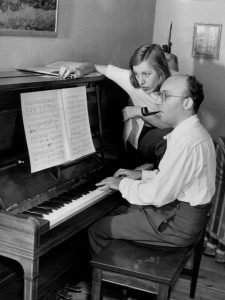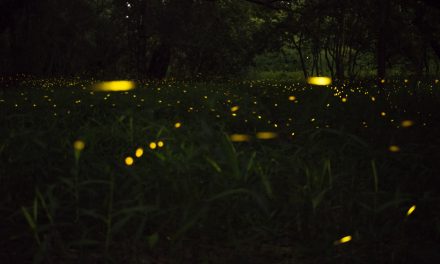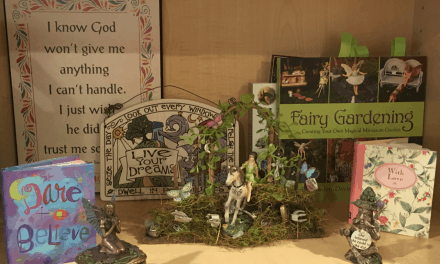How the American palate has changed in my lifetime! To assuage the anxiety brought on by today’s headlines, I often turn to my favorite comfort food, black beans and rice with salsa.
When I was a child, (aka, The Olden Days) salsa barely existed in supermarket aisles. Today, it’s the number one condiment in the U.S. Our everyday lives have been made more pleasurable through the simple act of embracing the tradition of another culture and assimilating it into our own.
Embracing the unfamiliar can be uncomfortable, yet from our palates to our podiums, it’s a hallmark of innovation and creativity. “It seems to be one of the paradoxes of creativity that in order to think originally, we must familiarize ourselves with the ideas of others,” writes author and educator George Kneller. This principle, the belief that through embracing diverse influences music could serve a greater social purpose, was a bedrock tenet underlying most of composer Kurt Weill’s career.

Kurt Weill and wife Lotte Lenya at home, 1942
The son of a cantor, Kurt Weill was born in Germany in 1900. As a young man he studied composition with the eminent German composer Engelbert Humperdinck, but his tenure with Humperdinck was brought to an abrupt end after one year by Weill’s financial difficulties and his frustration with Humperdinck’s conservative approach to composition.
Weill eventually landed in the teaching studio of the brilliant concert pianist and composer Ferruccio Busoni. Though he was sickly and at the end of his life, over the next three years Busoni would influence the compositional technique and philosophy that shaped Weill’s career, a career that would ultimately impact American popular music.
Busoni taught Weill to both build upon the musical past and draw upon the experiments of the present when composing. “Don’t overthrow something existing,” he said, “but recreate something that already exists.” This advice is apparent in Weill’s most famous composition, The Threepenny Opera,(1928) an adaption of a 200-year-old play, The Beggar’s Opera, by John Gay. It incorporates both the past and the present – the contrapuntal techniques of Bach, as well as 20th century jazz rhythm and harmony.
Indeed, its most famous composition, “Mack the Knife,” eventually became a jazz standard in the Great American Songbook, covered by everyone from Frank Sinatra to Lyle Lovett.
The thread running through the tapestry of Weill’s music, however, beyond its craftmanship and artistry, is Weill’s commitment to writing music that serves a greater social purpose. The Threepenny Opera, for example, is a biting social satire of opera and high society. With its main characters drawn from criminals and prostitutes from the seedy underworld of 1920’s Berlin, the opera is a caustic mockery of capitalist society.
For a Jew in Berlin in 1928, this was a courageous act. The Nazis eventually made it clear that Weill was not welcome there, and he fled Germany, arriving in New York in 1935.
Weill’s last masterwork, the richly eloquent score to Lost in the Stars, (1949) capped the composer’s career. Based on Cry, the Beloved Country, Alan Paton’s poignant novel about racial strife in South Africa, Lost in the Stars debuted on Broadway just one year before Weill’s untimely death at the young age of 50.
Lost in the Stars addresses issues that feel eerily relevant today – systemic racism, fear of change, fear of the loss of a familiar way of life. It is a rich and poetic narrative filled with Biblical allegory, addressing the pain of heartache and longing, but also the redemption that comes from forgiveness and reconciliation. It is, quite simply, a masterpiece, and Weill’s haunting music underscores the raw emotion inherent in the musical.
The title song, “Lost in the Stars,” speaks of the deep despair experienced by the main character, the Rev. Stephen Kumalo, as he faces the

The author, harpist Christa Grix
dark night of the soul, questioning the existence of the Divine, and the value of his life’s work. (Frank Sinatra sings the performance of his life here.) It gives me shivers to realize that Weill wrote this heart-rending work so close to his own demise. Lost in the Stars, with its social commentary on race relations, paved the way for West Side Story which played on Broadway just 11 years later.
70 years following the debut of Lost in the Stars, our society faces similar concerns – we fear change, we fear the loss of a familiar way of life, we face racial strife and reconciliation.
The pandemic, climate change and civil unrest have brought me, too, to the dark night of my soul. Will I ever play a live concert again? And even if I do, will I have anything to say? It is both reassuring and disturbing to realize that none of this is new.
Yes, comfort food helps. But I must also take heed of the masters before me, like Weill, who used their artistry as a springboard for a greater social purpose.
In my small, quiet way, I am challenged to do the same.
My musical offering to you today is “Evening Prayer,” a work by Kurt Weill’s first teacher, Engelbert Humperdinck. In the spirit of embracing new ways to express the familiar, my arrangement includes 20th century jazz harmonies and rhythms supporting this beautiful 19th century melody. I hope you enjoy it!
About the Author: Christa Grix
 As both a jazz and classical harpist, Christa Grix is one of those rare musicians who can make the transition from the jazz rhythm section to the symphonic string section sound effortless. She’s proud to be a working musician in the Detroit, Michigan area, home of Motown, and some of the finest musicians in the world.
As both a jazz and classical harpist, Christa Grix is one of those rare musicians who can make the transition from the jazz rhythm section to the symphonic string section sound effortless. She’s proud to be a working musician in the Detroit, Michigan area, home of Motown, and some of the finest musicians in the world.
Like and follow her on Facebook,YouTube and Instagram, or at her website at www.christagrix.com.





